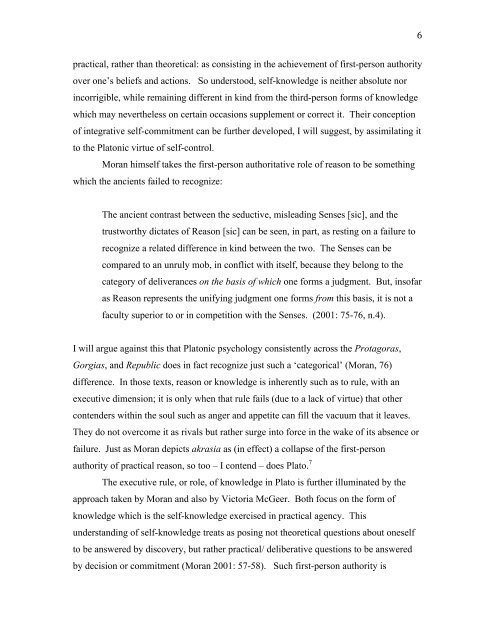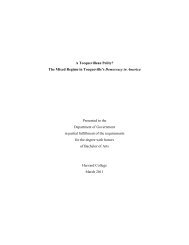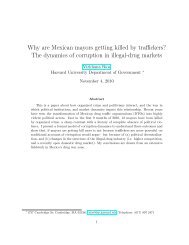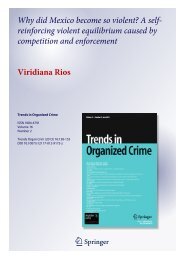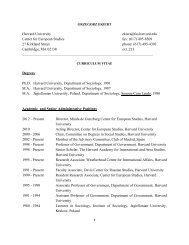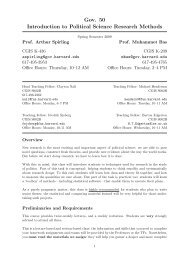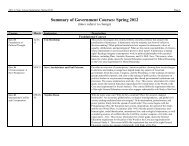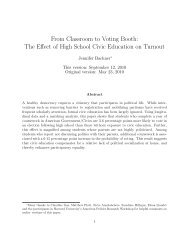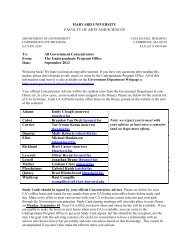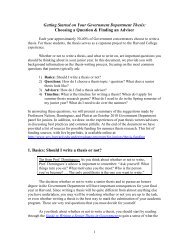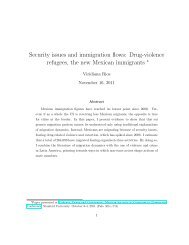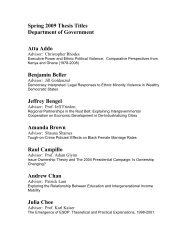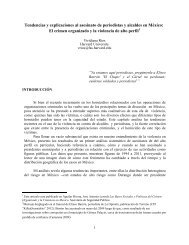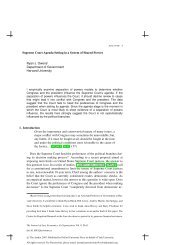1 Harvard University Political Theory Colloquium For 11 March 2010 ...
1 Harvard University Political Theory Colloquium For 11 March 2010 ...
1 Harvard University Political Theory Colloquium For 11 March 2010 ...
You also want an ePaper? Increase the reach of your titles
YUMPU automatically turns print PDFs into web optimized ePapers that Google loves.
6 <br />
practical, rather than theoretical: as consisting in the achievement of first-person authority<br />
over one’s beliefs and actions. So understood, self-knowledge is neither absolute nor<br />
incorrigible, while remaining different in kind from the third-person forms of knowledge<br />
which may nevertheless on certain occasions supplement or correct it. Their conception<br />
of integrative self-commitment can be further developed, I will suggest, by assimilating it<br />
to the Platonic virtue of self-control.<br />
Moran himself takes the first-person authoritative role of reason to be something<br />
which the ancients failed to recognize:<br />
The ancient contrast between the seductive, misleading Senses [sic], and the<br />
trustworthy dictates of Reason [sic] can be seen, in part, as resting on a failure to<br />
recognize a related difference in kind between the two. The Senses can be<br />
compared to an unruly mob, in conflict with itself, because they belong to the<br />
category of deliverances on the basis of which one forms a judgment. But, insofar<br />
as Reason represents the unifying judgment one forms from this basis, it is not a<br />
faculty superior to or in competition with the Senses. (2001: 75-76, n.4).<br />
I will argue against this that Platonic psychology consistently across the Protagoras,<br />
Gorgias, and Republic does in fact recognize just such a ‘categorical’ (Moran, 76)<br />
difference. In those texts, reason or knowledge is inherently such as to rule, with an<br />
executive dimension; it is only when that rule fails (due to a lack of virtue) that other<br />
contenders within the soul such as anger and appetite can fill the vacuum that it leaves.<br />
They do not overcome it as rivals but rather surge into force in the wake of its absence or<br />
failure. Just as Moran depicts akrasia as (in effect) a collapse of the first-person<br />
authority of practical reason, so too – I contend – does Plato. 7<br />
The executive rule, or role, of knowledge in Plato is further illuminated by the<br />
approach taken by Moran and also by Victoria McGeer. Both focus on the form of<br />
knowledge which is the self-knowledge exercised in practical agency. This<br />
understanding of self-knowledge treats as posing not theoretical questions about oneself<br />
to be answered by discovery, but rather practical/ deliberative questions to be answered<br />
by decision or commitment (Moran 2001: 57-58). Such first-person authority is


